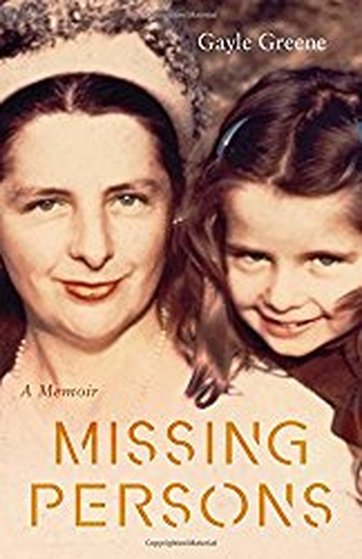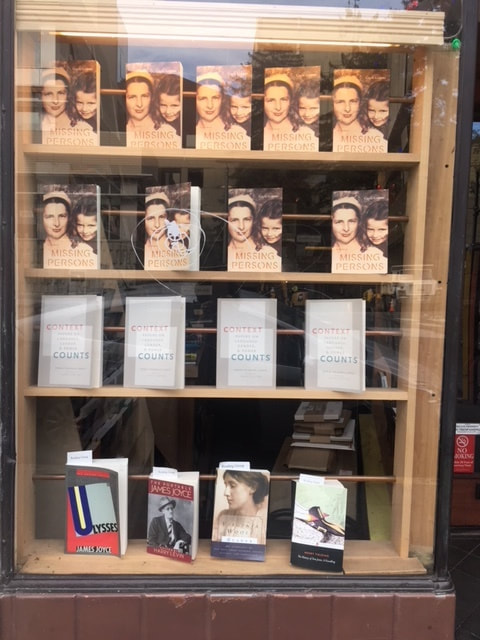"When Gayle Greene suddenly becomes the last living member of her family, she finds herself yearning for a fuller understanding of the people she has lost—her complicated mother, her father who left the family decades earlier, and her brother who took his own life. In Missing Persons, Greene's attempt to untangle her knotty family history (while dealing with a house crammed with its detritus) becomes a remarkable act of exorcism, reconstruction, and epiphany. Missing Persons’s mix of candor, humor, and wisdom will speak to anyone who has ever lost a loved one—as well as anyone who has a loved one to lose."
--Jean Hegland, author of Into the Forest
“Gayle Greene's Missing Persons is a compelling work. A powerful memoir of growing up in a California that we've lost, as technology has replaced orchards with internet servers, the book introduces us to a lively core family: two closely bonded sisters and the author herself, along with a charismatic but feckless father and a sweet but eventually depressive younger brother. Focusing in particular on the deaths of her mother and her aunt, Greene also recalls the best moments in her childhood, her parents' divorce, her father's adventures, and her brother's sorrowful suicide. Another theme is the writer's own evolution as a woman and an intellectual. The writing is vivid, passionate and yet disciplined, in many ways a tour de force. Hard to put down!”
--Sandra M. Gilbert, author of Wrongful Death: A Memoir
“Missing Persons is a lyrical, deeply moving, fast-paced and emotionally powerful memoir. It speaks to many possible readers: to the recently bereaved, to daughters who have lost their mothers, to the generation of feminists who strove to forge new lives and identities out of the strictly prescribed roles for women in the 1950s, and to the ways we all struggle to re-ground ourselves and forge enduring bonds of friendship and family in the midst of loss. As a reader, I felt gripped throughout.”
--Madelon Sprengnether, author of Great River Road: Memoir and Memory
“...elegant, poetical…emotionally affecting… and despite the gravity of the subject, punctuated with lighthearted humor.”
--Kirkus Reviews
"...a stunner."
--Women's Studies
A "fascinating foray into loss, grief, and self-identity...Greene doesn't hold back. The emotional pain she shares in these chapters is real and raw, reminiscent of Joan Didion's Year of Magical Thinking."
--Mary Potter Kenyon, Story Circle Book Reviews
I never intended to write a memoir. I didn’t even read memoirs, until, blindsided by the deaths of my mother and aunt, six weeks apart, I started reading every grief memoir I could lay hands on, every story about losing a parent, everything I could find about mothers and daughters. I never found a story like ours.
It’s said that the loss of a parent is a rite of passage—but passage to where? and how? I was catapulted into questions of who am I, what have I done with my life? Most grief memoirs are structured on death as the end, but I wanted to know, what now? What next? I needed a new story.
Missing Persons tells a story so like what so many people go through that many readers have found themselves in this book: the harrowing health emergencies; the doctors who are clueless about dying; the kafkaesque medical bureaucracy; the inexorable slide to the end. Then, finding a way of mourning with none of the conventional consolations people turn to at a time of loss, no faith or family, needing to patch together a way of grieving and letting go, making it up as I went along. How to commemorate these lives, these deaths, how to make a memorial, what to do with the ashes, and the things, so many things, the detritus of decades. And the photos, nearly a century of achingly beautiful photos of a family gone missing. Of a California gone missing.
Missing Persons writes a chapter in the history of Silicon Valley when it was the Santa Clara Valley, a place so paradisiacal that people came from miles around to see the blossoms in the spring. I grew up in the years the vast orchards were being dug up and paved over for tract housing, strip malls, freeways. I grew up hearing the grinding of bulldozers and backhoes, the thud of tree trunks and branches hitting the ground, the ratatatat of hammers. Now the "Valley of Heart's Delight" has become the high-tech center of the world, but at what price: it has 23 toxic Superfund sites and a gap between rich and poor wider than anywhere in the country. You don’t have to be from Silicon Valley to have lived through the loss of a place. The song that haunts me as I’m packing up my mother’s house and saying goodbye to the valley— they paved paradise— is about Hawaii. It's a theme of our time.
Are you in book club? I’d be happy to visit. See "Book Club Resources" here.
Presentation at Scripps College
--Jean Hegland, author of Into the Forest
“Gayle Greene's Missing Persons is a compelling work. A powerful memoir of growing up in a California that we've lost, as technology has replaced orchards with internet servers, the book introduces us to a lively core family: two closely bonded sisters and the author herself, along with a charismatic but feckless father and a sweet but eventually depressive younger brother. Focusing in particular on the deaths of her mother and her aunt, Greene also recalls the best moments in her childhood, her parents' divorce, her father's adventures, and her brother's sorrowful suicide. Another theme is the writer's own evolution as a woman and an intellectual. The writing is vivid, passionate and yet disciplined, in many ways a tour de force. Hard to put down!”
--Sandra M. Gilbert, author of Wrongful Death: A Memoir
“Missing Persons is a lyrical, deeply moving, fast-paced and emotionally powerful memoir. It speaks to many possible readers: to the recently bereaved, to daughters who have lost their mothers, to the generation of feminists who strove to forge new lives and identities out of the strictly prescribed roles for women in the 1950s, and to the ways we all struggle to re-ground ourselves and forge enduring bonds of friendship and family in the midst of loss. As a reader, I felt gripped throughout.”
--Madelon Sprengnether, author of Great River Road: Memoir and Memory
“...elegant, poetical…emotionally affecting… and despite the gravity of the subject, punctuated with lighthearted humor.”
--Kirkus Reviews
"...a stunner."
--Women's Studies
A "fascinating foray into loss, grief, and self-identity...Greene doesn't hold back. The emotional pain she shares in these chapters is real and raw, reminiscent of Joan Didion's Year of Magical Thinking."
--Mary Potter Kenyon, Story Circle Book Reviews
I never intended to write a memoir. I didn’t even read memoirs, until, blindsided by the deaths of my mother and aunt, six weeks apart, I started reading every grief memoir I could lay hands on, every story about losing a parent, everything I could find about mothers and daughters. I never found a story like ours.
It’s said that the loss of a parent is a rite of passage—but passage to where? and how? I was catapulted into questions of who am I, what have I done with my life? Most grief memoirs are structured on death as the end, but I wanted to know, what now? What next? I needed a new story.
Missing Persons tells a story so like what so many people go through that many readers have found themselves in this book: the harrowing health emergencies; the doctors who are clueless about dying; the kafkaesque medical bureaucracy; the inexorable slide to the end. Then, finding a way of mourning with none of the conventional consolations people turn to at a time of loss, no faith or family, needing to patch together a way of grieving and letting go, making it up as I went along. How to commemorate these lives, these deaths, how to make a memorial, what to do with the ashes, and the things, so many things, the detritus of decades. And the photos, nearly a century of achingly beautiful photos of a family gone missing. Of a California gone missing.
Missing Persons writes a chapter in the history of Silicon Valley when it was the Santa Clara Valley, a place so paradisiacal that people came from miles around to see the blossoms in the spring. I grew up in the years the vast orchards were being dug up and paved over for tract housing, strip malls, freeways. I grew up hearing the grinding of bulldozers and backhoes, the thud of tree trunks and branches hitting the ground, the ratatatat of hammers. Now the "Valley of Heart's Delight" has become the high-tech center of the world, but at what price: it has 23 toxic Superfund sites and a gap between rich and poor wider than anywhere in the country. You don’t have to be from Silicon Valley to have lived through the loss of a place. The song that haunts me as I’m packing up my mother’s house and saying goodbye to the valley— they paved paradise— is about Hawaii. It's a theme of our time.
Are you in book club? I’d be happy to visit. See "Book Club Resources" here.
Presentation at Scripps College
Here's a short piece about writing the memoir: "The Tape on the Cutting Room Floor"
|
And here's a piece about mourning without markers in Psychology Today. And here's a review from Women's Studies: An Interdisciplinary Journal. |

